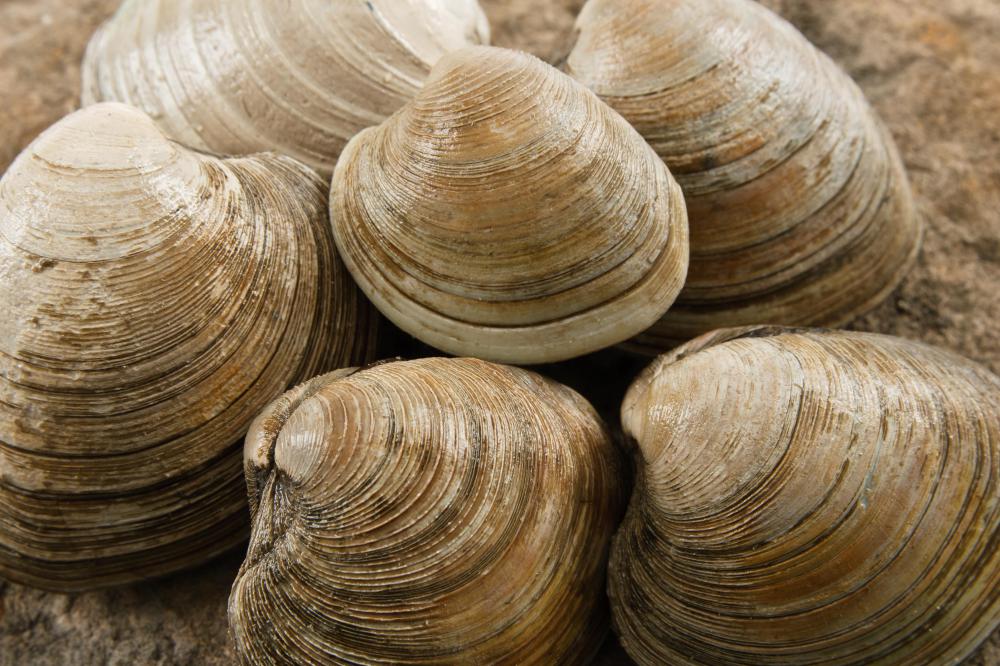At WiseGEEK, we're committed to delivering accurate, trustworthy information. Our expert-authored content is rigorously fact-checked and sourced from credible authorities. Discover how we uphold the highest standards in providing you with reliable knowledge.
What is a Shellfish Allergy?
A shellfish allergy is an allergy to shellfish, including crustaceans like crabs and shrimp along with mollusks such as mussels, abalone, and octopi. This food allergy is among the most common food allergies in the world, and it is also one of the more severe food allergies. Many people with a shellfish allergy are seriously allergic, and they can become seriously sick or die as a result of eating shellfish. This makes avoidance of crustaceans and mollusks critical.
This allergy develops when someone's body determines that the proteins in shellfish represent dangerous invaders. The body programs antibodies to respond to those proteins, and when shellfish is consumed, those antibodies go on the attack, triggering a release of histamines into the bloodstream and a cascading reaction of symptoms. Numbness and tingling around the mouth are common, along with wheezing and airway obstruction. Vomiting and other gastrointestinal symptoms can also occur when someone with a shellfish allergy consumes shellfish, and in extreme cases, anaphylaxis may develop.

Shellfish allergies can arise at any time in life, and people do not usually grow out of them, as is the case with some other allergies. If someone experiences even a mild reaction to eating shellfish, he or she should make an appointment with a doctor for allergy testing. Using a skin or blood test, the doctor can determine whether or not the patient has a shellfish allergy, and make recommendations accordingly. Some patients carry an emergency syringe with epinephrine to cope with allergic reactions.

In some cases, a patient may be allergic to only one variety of shellfish, not shellfish as a whole. Since testing this would involve consuming additional shellfish, most patients simply avoid shellfish altogether to minimize the risk. People with a shellfish allergy are also not generally allergic to fish. Allergies to iodine are also different, making shellfish safe to eat for people with iodine allergies.

There are a number of products for people with shellfish allergies to avoid, beyond foods which obviously contain shellfish. Some calcium supplements include shellfish, as do many glucosamine and omega-3 supplements. Many East Asian condiments like fish sauce utilize shellfish in their ingredients, and these condiments are widely used in the cuisines of regions like Thailand and Indonesia, making food from these areas unsafe for people with shellfish allergies.

Cross-contamination is another important issue for people with shellfish allergies, since a small amount of shellfish can be very dangerous. Cooking pans, deep fryers, and cutting boards which have been used for shellfish are unsafe for people with shellfish allergies, and people with these allergies may want to avoid seafood restaurants for this reason.
AS FEATURED ON:
AS FEATURED ON:

















Discussion Comments
@Viranty - I thankfully don't have any allergies, but I can definitely imagine that it must be quite difficult. My advice to you would be to make the best of what you have. In other words, though it's difficult, there are always ways to work around our limitations, allergies or not. This comes with careful preparation and observation.
One time, I was at a college outing called the Celebration of Asia. I really enjoyed the event, but I think I would have like it more if I was able to have some of the exotic dishes. Not only was it frustrating that I couldn't enjoy what others were enjoying, but I felt rude not eating what was served. I could have spoken up and told them about my allergies, but it's not that easy. Unless you have an allergy yourself, it's hard to grasp.
As the article indirectly states, being allergic to shellfish is incredibly dangerous, especially when compared to other types of allergies. I don't have any food allergies, but I can imagine that it must be very difficult to avoid foods that are or related to shellfish. The reason being that even if you do avoid them, there's the issue of cross contamination (as the article also states).
Post your comments